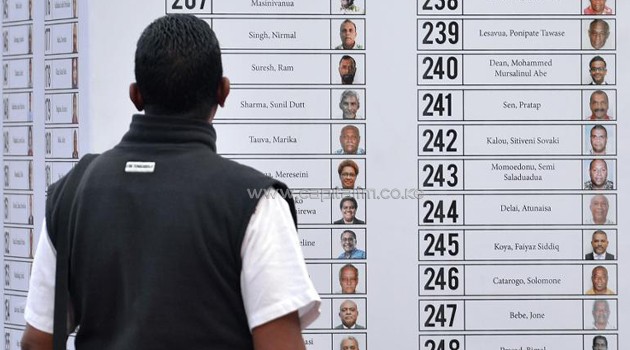The blackout also applies to political campaigning, election material such as posters or banners, as well as discussion of this week’s vote on public forums including social media sites.
Fiji’s elections supervisor Mohammed Saneem said the measure was intended to give the electorate a chance to reflect on how to vote in Wednesday’s poll without being bombarded by partisan messages intended to influence their decision.
“The blackout is there to protect the voter from incessant campaigning before polling so that the voter can decide without any influence or undue pressure,” he told reporters.
Campaign workers in Suva were busy removing promotional material before the start of the blackout, which runs from 7:30 am Monday (1930 GMT Sunday) to the close of polling at 6 pm on Wednesday.
© AFP
An election poster of Fiji’s military strongman Voreqe Bainimarama is seen torn off of a wall in the Fijian capital of Suva on September 15, 2014
© AFP Peter Parks
Countries such as New Zealand, which also goes to the polls this week, have a similar “election silence” period but they do not include the threat of jail terms.
They also cover only the hours when polling booths are open, not the days leading up to the vote, which are seen as critical by campaign managers to engage voters on key election issues.
Amnesty International executive director Grant Bayldon said he was concerned “the authorities in Fiji seem to have crossed the line when it comes to the media blackout currently in place”.
He said no one should face imprisonment solely for exercising freedom of expression, singling out a restriction that he said prevented comment on allegations of electoral misconduct.
“This does not appear to serve a legitimate purpose or be proportionate and would seem counterproductive to the Fiji government’s stated aims of transparency and accountability,” Bayldon said.
Fijian election laws introduced this year by the government of Voreqe Bainimarama, who seized power in a 2006 coup and is standing as a prime ministerial candidate, ban publication of any opinion polls in the week before the election.
Breaching the law can attract a five-year prison term and a FJ$10,000 (US$5,285) fine.
A multinational observer group comprising about 90 officials from more than a dozen countries has been set up to monitor the election and ensure it is free and fair.
© AFP
A man looks at the list of candidates for the up coming election in Suva, the capital of Fiji on September 15, 2014
© AFP Peter Parks
The group declined to comment on the media blackout, although it is understood to have raised the issue with Fijian officials.
The ban covers political analysis, interviews of candidates and anything that has the potential to influence voters.
– History of media censorship –
Fiji has a long history of media censorship, including Bainimarama’s introduction of emergency decrees that allowed him to send military officers into newsrooms to vet stories after he tore up the country’s constitution in 2009.
The emergency laws were lifted in 2012 but Amnesty said media in Fiji were still subject to “ongoing intimidation and harassment”, leaving journalists prone to self censorship to avoid causing offence.
“Amnesty International remains concerned that freedom of expression in Fiji is criminalised, or subject to restrictions not consistent with international human rights law,” it said in a report last month.
Reporters Without Borders this week raised concerns about two female journalists who said they received death threats over their coverage of a political debate that was cancelled at the last minute.
“The self-censorship generated by these threats seriously endangers the democratic process in these first parliamentary elections,” said Benjamin Ismail, the head of Reporters Without Borders’ Asia-Pacific desk.
Some 590,000 registered voters in the population of about 900,000 will have the chance to select from about 250 candidates standing for election to a new 50-seat parliament set up under a constitution adopted in 2013.










































